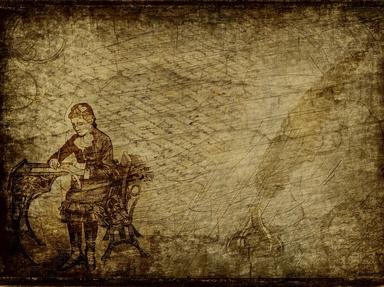Quiz Answer Key and Fun Facts
1. Perhaps Jeffers' most anthologized poem is his politically controversial "Shine, Perishing Republic." Can you recognize which line completes this stanza?
"But for my children, I would have them keep their distance from the thickening center; corruption
Never has been compulsory, _________________________________"
2. Jeffers was cynical, but also gifted at find good results in bad situations. These incomplete lines are from "The Bloody Sire."
"Who would remember _______________
Lacking the terrible halo of spears?
Who formed Christ but ____________,
The cruel and bloody victories of Caesar?"
3. In "The Excesses of God," Jeffers argues that humanity knows God through his "high superflousness." With which concept does Jeffers follow these powerful lines?
" . . . but to fling
Rainbows over the rain
And beauty above the moon, and secret rainbows
On the domes of deep sea-shells,
And make the necessary embrace of breeding
Beautiful also as fire,
Not even the weeds to multiply without blossom
Nor the birds without music:
There is the great humaneness at the heart of things,
The extravagant kindness, . . ."
4. In "Original Sin," Jeffers contrasts the "human dawn" with a natural dawn. Which line does NOT follow in the next few after this comparison?
" . . . Meanwhile the intense color and nobility of sunrise,
Rose and gold and amber, flowed up the sky. Wet rocks were shining, a little wind
Stirred the leaves of the forest and the marsh flag-flowers; the soft valley between the low hills
Became as beautiful as the sky; while in its midst, hour after hour, the happy hunters
Roasted their living meat slowly to death."
5. In "To the Stone-Cutters," Jeffers addresses the familiar poetic theme of death, and the human hope to live on at least in memories. Here is the beginning of the poem:
"Stone-cutters fighting time with marble, you foredefeated
Challengers of oblivion
Eat cynical earnings, knowing rock splits, records fall down,
The square-limbed Roman letters
Scale in the thaws, wear in the rain."
How does the poem end?
"Yet stones have stood for a thousand years, and pained thoughts found
___________________________."
6. All of these lines are in Jeffers' poem "To Death." Which is the poem's opening line?
7. In his beautiful poem "The Deer Lay Down Their Bones," Jeffers finds a secluded clearing wounded deer go to die in. What does he say directly after these lines?
". . . here they have water for the awful thirst
And peace to die in; dense green laurel and grim cliff
Make sanctuary, and sweet wind blows upward from the deep gorge.--"
8. Choose the line that finishes the first stanza of "For Una":
"I built her a tower when I was young--
Sometime she will die--
I built it with my hands, I hung
Stones in the sky.
Old but still strong I climb the stone--
Sometime she will die--
Climb the steep rough steps alone,
And weep in the sky
__________"
9. This line, perhaps Jeffers' most famous, caused him great trouble.
"I'd sooner, ___________________________; but the great redtail
Had nothing left but unable misery
From the bone too shattered for mending . . ."
10. In Jeffers' well-known poem "The Purse-Seine," he describes a fishing scene from near his home:
". . . the motorboat circles the gleaming shoal and drifts out her seine-net. They close the circle
And purse the bottom of the net, then with great labor haul it in.
I cannot tell you
How beautiful the scene is, and a little terrible . . ."
What does Jeffers' poem compare this scene to?
Source: Author
NormanW5
This quiz was reviewed by FunTrivia editor
agony before going online.
Any errors found in FunTrivia content are routinely corrected through our feedback system.
